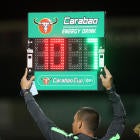
The days of managers sweating over how to use their third substitution could soon be a thing of the past. Instead it will be how they deploy their fourth and fifth options from the bench that will cause them sleepless nights after football's lawmakers today decided to make permanent a change to its laws initially introduced after the COVID-19 pandemic.
The International Football Associations Board (IFAB) has agreed to make permanent the temporary revision to Law Three of the sport, which allowed teams to make up to five substitutions per game. This was initially introduced as a temporary measure until December 2022 to ensure that player fitness could be more carefully managed during the condensed schedule of last summer.
However, it has proven to be a popular addition, particularly with managers and players, and IFAB's Football and Technical Advisory Panels have recommended that competitions should be able to decide on an increased number of substitutions "according to the needs of their football environment." Clubs will, however, remain limited in the number of times they can make the changes with a maximum of three intervals allowed plus half time.
UEFA competitions including the Champions League have allowed for five substitutions (with an additional change in extra time) since mid-2020 while four of Europe's top five leagues and MLS also put in place similar provisions. The most notable hold out is the English Premier League, whose member clubs opted against implementing the change for the 2020-21 season over fears it would favor the richest teams. That stance is likely to be further tested in the coming days particularly with the league having allowed for the naming of nine substitutes on the bench for any game.
Manchester City boss Pep Guardiola and his Liverpool counterpart Jurgen Klopp are among the most vocal critics of the three substitute rule. The former said in December: "All around the world it's five substitutions but here we believe we're more special. We don't protect the players."
















